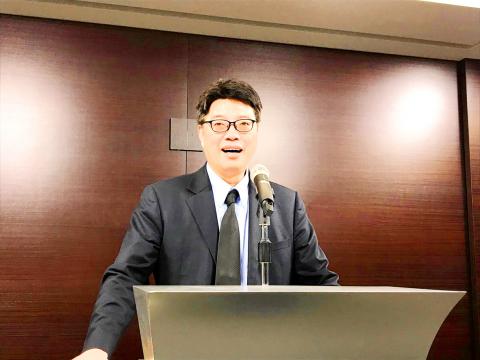The Ministry of the Interior yesterday issued a NT$500,000 fine to Ling Yu-shih (凌友詩), a Republic of China citizen, for accepting an official position in China.
According to the Web site of the Chinese People’s Political Consultative Conference (CPPCC), Ling accepted a seat at the organization as a representative of the China Taiwanese Association, a private organization established to “serve as a bridge and link between the ruling [Chinese Communist] party and government, and Taiwanese compatriots,” the ministry said in a statement.
As Ling also spoke at the fourth plenary meeting of the second session of the 13th CPPCC in Beijing on Monday — expressing “great anticipation” for Taiwan’s unification with China — she has clearly breached the Act Governing Relations Between the People of the Taiwan Area and the Mainland Area (臺灣地區與大陸地區人民關係條例), the ministry said.

Photo: CNA
Article 33 of the act prohibits Taiwanese from holding a position at, or becoming a member of, any agencies, institutions or organizations affiliated with Chinese political parties, or military or administrative bodies.
Those who contravene the article face a fine of between NT$100,000 and NT$500,000.
Ling is a citizen with household registration in Taiwan, so the rules still apply to her, the ministry said.
“Given that the position Ling occupies is at a national political organization of the Chinese Communist Party that wields great influence in the mainland area, as well as her extremely inappropriate pro-unification remarks at the fourth plenary meeting of the second session of the 13th CPPCC, we decided to impose on her the highest possible fine of NT$500,000,” it said.
The ministry urged Taiwanese to abide by the act and other regulations when engaging in cross-strait exchanges.
Mainland Affairs Council Deputy Minister Chiu Chui-cheng (邱垂正) said that the fine could be issued repeatedly if Ling remains a CPPCC member.
“Of course, she might ignore the fines and remain in China,” Chiu said, adding that the government is mulling amendments that would also allow authorities to revoke household registration if actions seriously undermine national interests.
Under existing laws, only nationals who are found to hold a People’s Republic of China passport or have a household registration in China face revocation of citizenship, he said.

Alain Robert, known as the "French Spider-Man," praised Alex Honnold as exceptionally well-prepared after the US climber completed a free solo ascent of Taipei 101 yesterday. Robert said Honnold's ascent of the 508m-tall skyscraper in just more than one-and-a-half hours without using safety ropes or equipment was a remarkable achievement. "This is my life," he said in an interview conducted in French, adding that he liked the feeling of being "on the edge of danger." The 63-year-old Frenchman climbed Taipei 101 using ropes in December 2004, taking about four hours to reach the top. On a one-to-10 scale of difficulty, Robert said Taipei 101

Nipah virus infection is to be officially listed as a category 5 notifiable infectious disease in Taiwan in March, while clinical treatment guidelines are being formulated, the Centers for Disease Control (CDC) said yesterday. With Nipah infections being reported in other countries and considering its relatively high fatality rate, the centers on Jan. 16 announced that it would be listed as a notifiable infectious disease to bolster the nation’s systematic early warning system and increase public awareness, the CDC said. Bangladesh reported four fatal cases last year in separate districts, with three linked to raw date palm sap consumption, CDC Epidemic Intelligence

US climber Alex Honnold left Taiwan this morning a day after completing a free-solo ascent of Taipei 101, a feat that drew cheers from onlookers and gained widespread international attention. Honnold yesterday scaled the 101-story skyscraper without a rope or safety harness. The climb — the highest urban free-solo ascent ever attempted — took just more than 90 minutes and was streamed live on Netflix. It was covered by major international news outlets including CNN, the New York Times, the Guardian and the Wall Street Journal. As Honnold prepared to leave Taiwan today, he attracted a crowd when he and his wife, Sanni,

Two Taiwanese prosecutors were questioned by Chinese security personnel at their hotel during a trip to China’s Henan Province this month, the Mainland Affairs Council (MAC) said yesterday. The officers had personal information on the prosecutors, including “when they were assigned to their posts, their work locations and job titles,” MAC Deputy Minister and spokesman Liang Wen-chieh (梁文傑) said. On top of asking about their agencies and positions, the officers also questioned the prosecutors about the Cross-Strait Joint Crime-Fighting and Judicial Mutual Assistance Agreement, a pact that serves as the framework for Taiwan-China cooperation on combating crime and providing judicial assistance, Liang